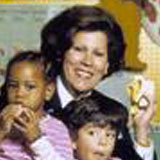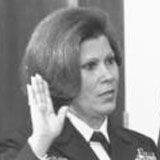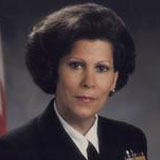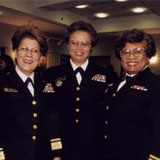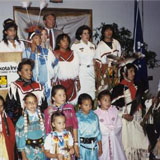Biography: Dr. Antonia Novello

Year: 1990
Achievement: Dr. Antonia Novello was the first woman and the first Hispanic to become Surgeon General of the United States.
Dr. Novello's favorite aunt died of kidney failure during Novello's first year of medical school. She resolved to learn more about the disease and the factors that decide who receives a kidney transplant.
As a youngster, Antonia Novello was hospitalized frequently with a medical condition that was not corrected until her late teens.
When Dr. Antonia Novello was appointed Surgeon General of the United States by President George Bush in 1990, she was the first woman—and the first Hispanic—ever to hold that office. Her appointment came after nearly two decades of public service at the National Institutes of Health, where she took a role in drafting national legislation regarding organ transplantation.
Born Antonia Coello in Farjardo, Puerto Rico, she suffered throughout her childhood from a medical condition that could only be corrected with surgery. Because her family could not afford the long trip to the surgical hospital, she spent part of every summer getting interim treatment in a local hospital. It was only after two surgeries, at age 18 and 20, that the condition was finally corrected. In the meantime, by the time she was a teenager she had decided to be a doctor, so that she could help other sick children.
Dr. Novello earned her M.D. degree from the University of Puerto Rico. While in medical school, she met and married Joseph Novello, a U.S. Navy doctor. She later completed her medical training in nephrology (the study of the kidneys) at the University of Michigan, where she was first woman to be named Intern of the Year.
Novello gained experience in pediatrics in Michigan until 1974 and, after postgraduate work at Georgetown University and several years in private practice, she joined the U.S. Public Health Service Commissioned Corps in 1978, working with the National Institute of Arthritis, Metabolism and Digestive Disorders at the National Institutes of Health. She became deputy director of the National Institute of Child Health and Human Development, where she focused on pediatric AIDS.
Novello continued to work in pediatrics at Georgetown University Hospital and in 1982 earned her degree in public health from Johns Hopkins School of Hygiene and Public Health. On assignment with the U.S. Senate Committee on Labor and Human Resources, she helped draft legislation for the Organ Transplantation Procurement Act of 1984.
Through the prestige and authority of this office, the Surgeon General can more effectively exhort and educate the public on pervasive health issues. As surgeon general, Novello focused on the health of young people, women, and minorities. She issued reports and spoke out on under-age drinking, smoking, drug abuse AIDS (especially among women and adolescents), childhood immunization and injury prevention, and improved health care for Hispanics and other minorities.
One of her most visible and effective campaigns was against tobacco industry advertising aimed at children, especially evident in posters and billboard advertisements that featured the cartoon character "Joe Camel."
Dr. Novello alerted the nation to the rising incidence of AIDS among women and adolescents. Her 1993 report on AIDS, while counseling against promiscuity and drug use, also included instructions on using condoms and cleaning intravenous needles.
During the Gulf War, Dr. Novello expedited the Federal Drug Administration approval of vaccines for military personnel, for which she was later awarded the Legion of Merit, a military honor, by General Colin Powell.
After serving as Surgeon General, Dr. Novello was a special representative to United Nations Children's Fund from 1993-1996, where she expanded her efforts to address the health and nutritional needs of women, children, and adolescents, to a global scale. From 1996 to 1999 she was visiting professor of health policy and management at Johns Hopkins School of Health and Hygiene, where she advised on health services for poor communities. To mark the fiftieth anniversary of the Universal Declaration of Human Rights in 1998, Novello organized an unprecedented meeting between Surgeon General David Satcher and seven others, besides herself, who had held the office. In 1999, Governor George Pataki nominated her to be commissioner of health for the state of New York, where she now heads one of the largest public health agencies in the country.
What was my biggest obstacle?
Dr. Novello came from a poor family. Her parents divorced and her father died when she was 4. Her mother was a high-school principal in a distant town and usually was home only on weekends. Because she was an outstanding student, Novello was able to get a scholarship to study at the University of Puerto Rico.
Dr. Novello's chronic health problem limited her activity during childhood, sapping her energy and requiring long periods of hospitalization. Her first corrective surgery at age 18 was not completely successful, and she had to have a second operation when she was 20.
How did I make a difference?
Dr. Novello made a huge impact on American public health through her work at the National Institutes of Health and especially as surgeon general. Her most significant contributions were in setting guidelines for organ transplantations, in leading a campaign against tobacco companies who targeted children in cigarette ads, in raising public awareness about AIDS and its spread among women and children, and in improving general health care for women, children, Hispanics, and other minorities.
Who was my mentor?
Dr. Novello's mother, Ana Delia Flores Coello, taught her to work hard in school in order to have a better life, and to care about and respect other people.
How has my work evolved over time?
Dr. Novello began her career as a pediatrician, but found the experience emotionally difficult when she was dealing with children who were severely or terminally ill. "When the pediatrician cries as much as the parents do, then you know it's time to get out."
Dr. Novello went into preventative medicine with the U.S. Public Health Service and became involved in public health policy and legislation. In subsequent positions and especially as surgeon general, she used the power of her office to bring public attention to health problems she felt were particularly urgent, especially those directly affecting young people: underage drinking, smoking, and pediatric AIDS. She also called attention to the problems of access to health care for minority groups. Her concern for children continued to be an important motive for her work, but she acted on a legislative rather than an individual level, thereby affecting a much larger population.




